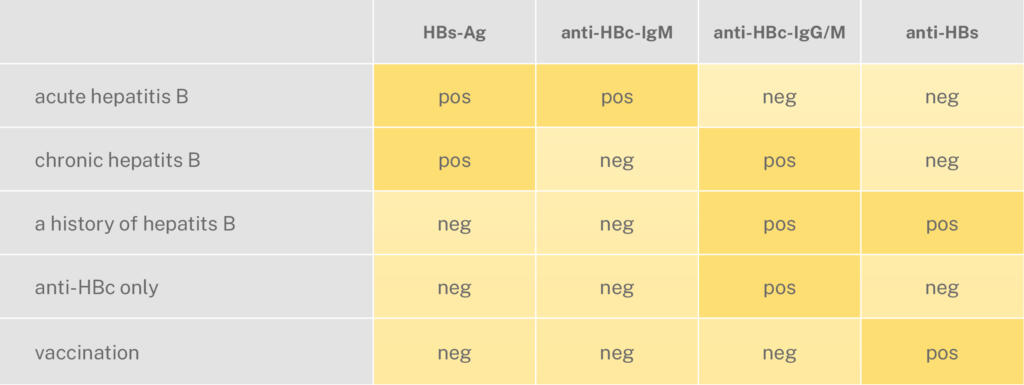Hepatitis B
When to test?
The hepatitis B virus is highly contagious and can be transmitted through bodily fluids when sharing needles, using non-sterile tattooing or piercing equipment or having sexual intercourse (see hepatitis B), and from mother to child during childbirth. Tests should be suggested to all unvaccinated individuals, especially after a negative hepatitis B test, i.e. even if no antibodies and thus no vaccination protection are present. (see also vaccination recommendations for hepatitis B of the BAG).
Tests and diagnosis
If HBV infection is suspected, an HBs antigen test and an HBc antibody test are performed. If the HBs antigen test is positive, active hepatitis B is present. If the HBs antigen test is negative, but HBc antibodies are present, the patient has previously experienced a hepatitis B infection that has healed.
Overview of the interpretation of the test results:
Further tests are performed if HBs antigen is positive: For example, the determination of the HBe antigen and HBe antibodies as well as the amount of virus in the blood provides information about the activity of the hepatitis. An examination of the liver values (transaminases) and the fibrosis stage should also be performed.
If HBV infection is present, the patient should be referred to a specialist for further treatment (a hepatologist, gastroenterologist, infectiologist or - if an addiction is present - an addict physician experienced in the treatment of hepatitis B).
Treatment
An acute hepatitis B infection cures itself in 90 percent of cases. There are no drugs available to treat the acute infection. A chronic infection must be treated if it progresses: Treatment is usually with antiviral drugs (nucleoside and nucleotide analogues) or with pegylated interferon.
The aim is to suppress the viruses in the long term and normalize liver values in the blood. Depending on the course of treatment, the therapy lasts between six to twelve months (interferon) and several years (nucleotide/nucleoside analogues). If the course is mild, regular check-ups by the doctor are sufficient.

Studies and articles
-
Recommandations de la SSI, de la SASL et d’Hépatite Suisse: Dépistage de l'hépatite B et C et du VIH chez les adultes originaires d'Ukraine
Bruggmann P, Scheidegger C, Semela D
Forum Med Suisse. 2022;22(37):610-611; 14.09.2022 -
Hepatitis B and C in Switzerland – healthcare provider initiated testing for chronic hepatitis B and C infection
Fretz R, Negro F, Bruggmann P, Lavanchy D, De Gottardi A, Pache I, Masserey Spicher V, A Cerny
Swiss Med Wkly. 2013;143:w13793; 06.05.2013